COMS 560: Conflict Management Brief - Personal Assessment Analysis
VerifiedAdded on 2023/03/30
|6
|1046
|218
Report
AI Summary
This report is a business brief analyzing a student's conflict management style, as assessed through a personal conflict assessment. The assessment revealed the student's tendencies towards compromising and problem-solving, with specific percentages for each style. The student reflects on these results, noting both surprise and confirmation of their approach. The report explores contributing factors to the student's conflict style, including interdependence, ambiguity, and individual roles within a team. Strengths such as strategic planning are identified, along with areas for improvement. The student proposes strategies to enhance effectiveness, such as identifying the core problem and employing collective bargaining. The report concludes with a reflection on the student's conflict management approach, emphasizing the goal of achieving win-win situations and the importance of compromise within ethical and humanistic frameworks. The report uses concepts from the readings and offers a framework to enhance conflict management skills.

Paraphrase This Document
Need a fresh take? Get an instant paraphrase of this document with our AI Paraphraser
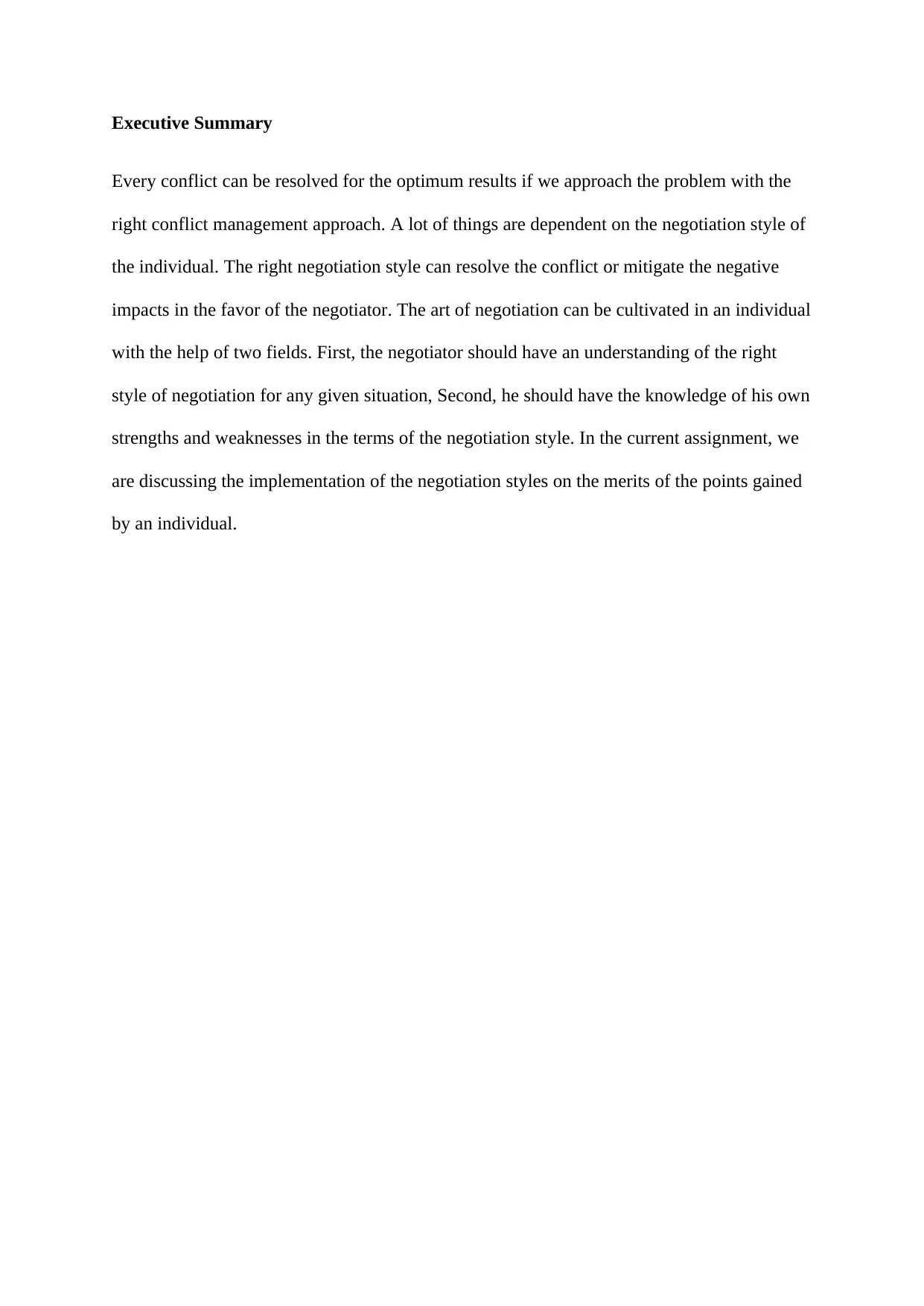
Executive Summary
Every conflict can be resolved for the optimum results if we approach the problem with the
right conflict management approach. A lot of things are dependent on the negotiation style of
the individual. The right negotiation style can resolve the conflict or mitigate the negative
impacts in the favor of the negotiator. The art of negotiation can be cultivated in an individual
with the help of two fields. First, the negotiator should have an understanding of the right
style of negotiation for any given situation, Second, he should have the knowledge of his own
strengths and weaknesses in the terms of the negotiation style. In the current assignment, we
are discussing the implementation of the negotiation styles on the merits of the points gained
by an individual.
Every conflict can be resolved for the optimum results if we approach the problem with the
right conflict management approach. A lot of things are dependent on the negotiation style of
the individual. The right negotiation style can resolve the conflict or mitigate the negative
impacts in the favor of the negotiator. The art of negotiation can be cultivated in an individual
with the help of two fields. First, the negotiator should have an understanding of the right
style of negotiation for any given situation, Second, he should have the knowledge of his own
strengths and weaknesses in the terms of the negotiation style. In the current assignment, we
are discussing the implementation of the negotiation styles on the merits of the points gained
by an individual.
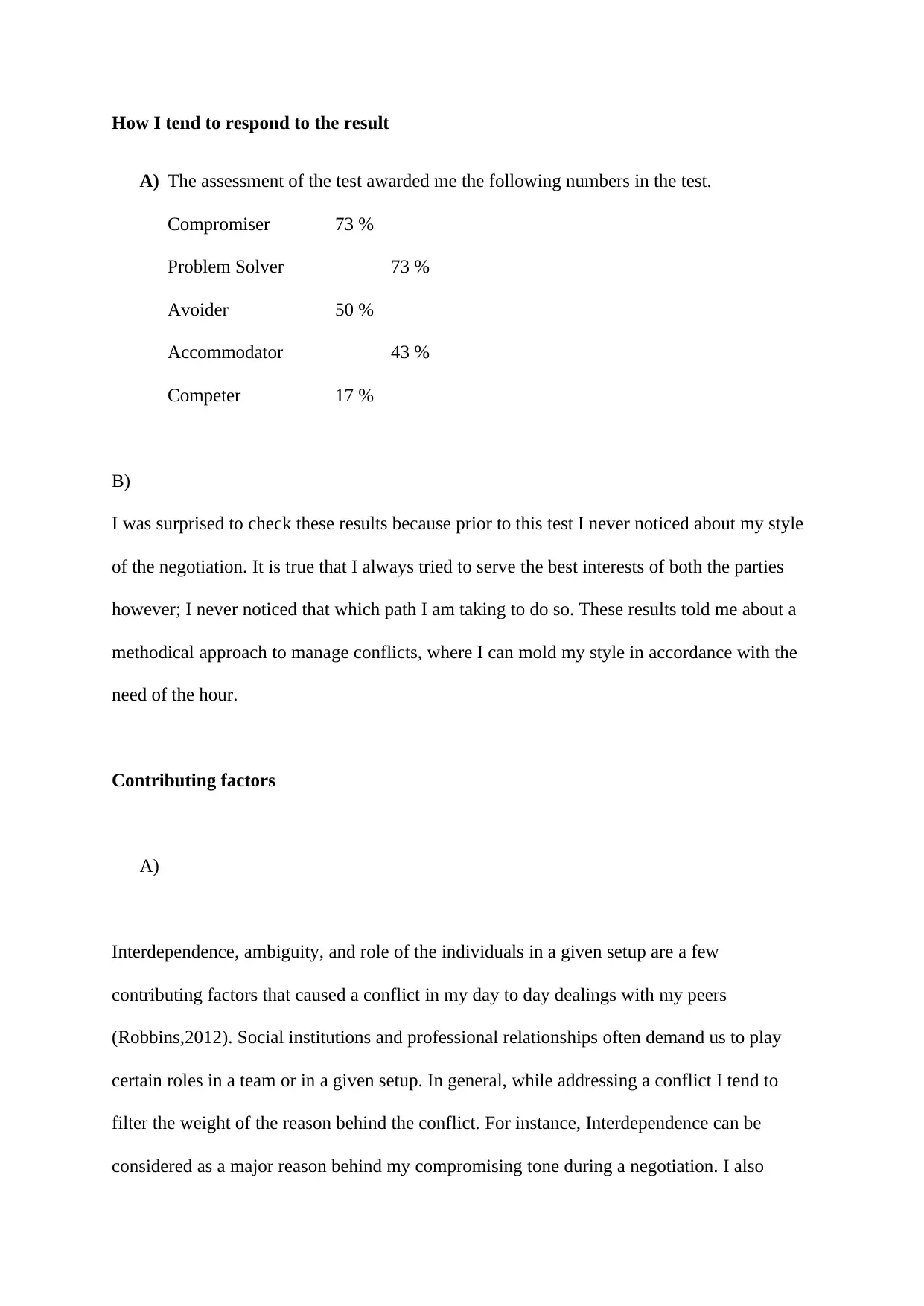
How I tend to respond to the result
A) The assessment of the test awarded me the following numbers in the test.
Compromiser 73 %
Problem Solver 73 %
Avoider 50 %
Accommodator 43 %
Competer 17 %
B)
I was surprised to check these results because prior to this test I never noticed about my style
of the negotiation. It is true that I always tried to serve the best interests of both the parties
however; I never noticed that which path I am taking to do so. These results told me about a
methodical approach to manage conflicts, where I can mold my style in accordance with the
need of the hour.
Contributing factors
A)
Interdependence, ambiguity, and role of the individuals in a given setup are a few
contributing factors that caused a conflict in my day to day dealings with my peers
(Robbins,2012). Social institutions and professional relationships often demand us to play
certain roles in a team or in a given setup. In general, while addressing a conflict I tend to
filter the weight of the reason behind the conflict. For instance, Interdependence can be
considered as a major reason behind my compromising tone during a negotiation. I also
A) The assessment of the test awarded me the following numbers in the test.
Compromiser 73 %
Problem Solver 73 %
Avoider 50 %
Accommodator 43 %
Competer 17 %
B)
I was surprised to check these results because prior to this test I never noticed about my style
of the negotiation. It is true that I always tried to serve the best interests of both the parties
however; I never noticed that which path I am taking to do so. These results told me about a
methodical approach to manage conflicts, where I can mold my style in accordance with the
need of the hour.
Contributing factors
A)
Interdependence, ambiguity, and role of the individuals in a given setup are a few
contributing factors that caused a conflict in my day to day dealings with my peers
(Robbins,2012). Social institutions and professional relationships often demand us to play
certain roles in a team or in a given setup. In general, while addressing a conflict I tend to
filter the weight of the reason behind the conflict. For instance, Interdependence can be
considered as a major reason behind my compromising tone during a negotiation. I also
⊘ This is a preview!⊘
Do you want full access?
Subscribe today to unlock all pages.

Trusted by 1+ million students worldwide
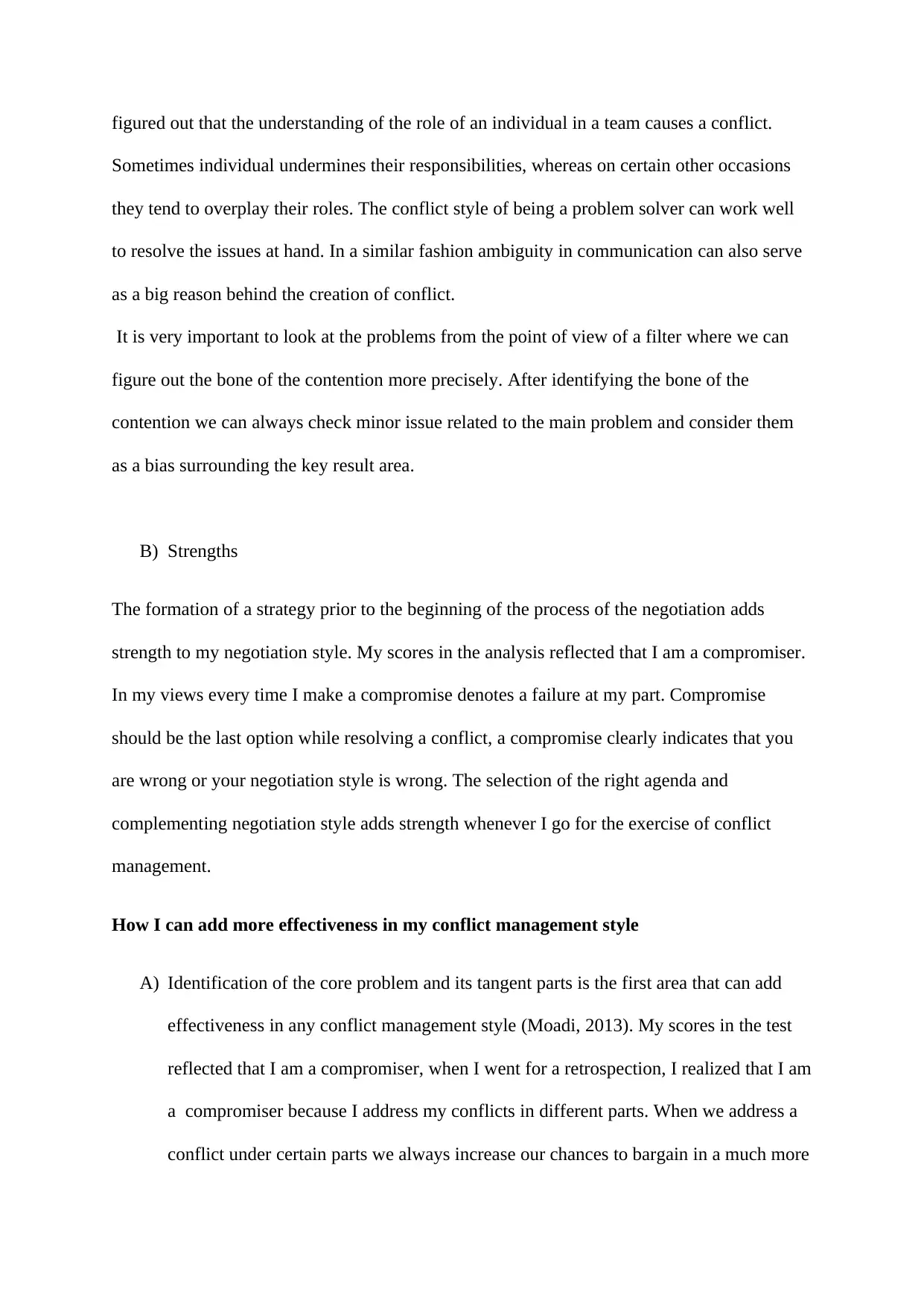
figured out that the understanding of the role of an individual in a team causes a conflict.
Sometimes individual undermines their responsibilities, whereas on certain other occasions
they tend to overplay their roles. The conflict style of being a problem solver can work well
to resolve the issues at hand. In a similar fashion ambiguity in communication can also serve
as a big reason behind the creation of conflict.
It is very important to look at the problems from the point of view of a filter where we can
figure out the bone of the contention more precisely. After identifying the bone of the
contention we can always check minor issue related to the main problem and consider them
as a bias surrounding the key result area.
B) Strengths
The formation of a strategy prior to the beginning of the process of the negotiation adds
strength to my negotiation style. My scores in the analysis reflected that I am a compromiser.
In my views every time I make a compromise denotes a failure at my part. Compromise
should be the last option while resolving a conflict, a compromise clearly indicates that you
are wrong or your negotiation style is wrong. The selection of the right agenda and
complementing negotiation style adds strength whenever I go for the exercise of conflict
management.
How I can add more effectiveness in my conflict management style
A) Identification of the core problem and its tangent parts is the first area that can add
effectiveness in any conflict management style (Moadi, 2013). My scores in the test
reflected that I am a compromiser, when I went for a retrospection, I realized that I am
a compromiser because I address my conflicts in different parts. When we address a
conflict under certain parts we always increase our chances to bargain in a much more
Sometimes individual undermines their responsibilities, whereas on certain other occasions
they tend to overplay their roles. The conflict style of being a problem solver can work well
to resolve the issues at hand. In a similar fashion ambiguity in communication can also serve
as a big reason behind the creation of conflict.
It is very important to look at the problems from the point of view of a filter where we can
figure out the bone of the contention more precisely. After identifying the bone of the
contention we can always check minor issue related to the main problem and consider them
as a bias surrounding the key result area.
B) Strengths
The formation of a strategy prior to the beginning of the process of the negotiation adds
strength to my negotiation style. My scores in the analysis reflected that I am a compromiser.
In my views every time I make a compromise denotes a failure at my part. Compromise
should be the last option while resolving a conflict, a compromise clearly indicates that you
are wrong or your negotiation style is wrong. The selection of the right agenda and
complementing negotiation style adds strength whenever I go for the exercise of conflict
management.
How I can add more effectiveness in my conflict management style
A) Identification of the core problem and its tangent parts is the first area that can add
effectiveness in any conflict management style (Moadi, 2013). My scores in the test
reflected that I am a compromiser, when I went for a retrospection, I realized that I am
a compromiser because I address my conflicts in different parts. When we address a
conflict under certain parts we always increase our chances to bargain in a much more
Paraphrase This Document
Need a fresh take? Get an instant paraphrase of this document with our AI Paraphraser
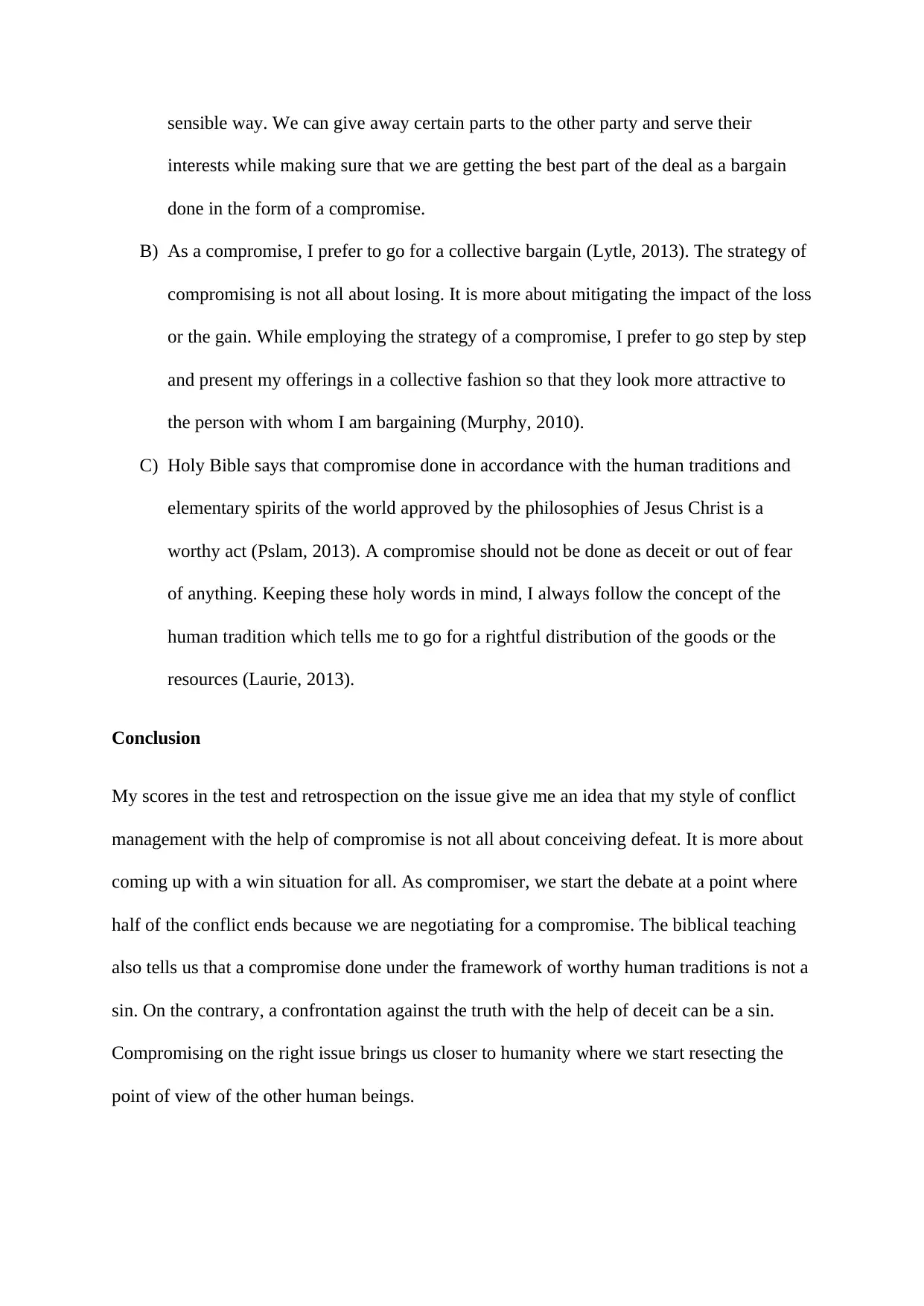
sensible way. We can give away certain parts to the other party and serve their
interests while making sure that we are getting the best part of the deal as a bargain
done in the form of a compromise.
B) As a compromise, I prefer to go for a collective bargain (Lytle, 2013). The strategy of
compromising is not all about losing. It is more about mitigating the impact of the loss
or the gain. While employing the strategy of a compromise, I prefer to go step by step
and present my offerings in a collective fashion so that they look more attractive to
the person with whom I am bargaining (Murphy, 2010).
C) Holy Bible says that compromise done in accordance with the human traditions and
elementary spirits of the world approved by the philosophies of Jesus Christ is a
worthy act (Pslam, 2013). A compromise should not be done as deceit or out of fear
of anything. Keeping these holy words in mind, I always follow the concept of the
human tradition which tells me to go for a rightful distribution of the goods or the
resources (Laurie, 2013).
Conclusion
My scores in the test and retrospection on the issue give me an idea that my style of conflict
management with the help of compromise is not all about conceiving defeat. It is more about
coming up with a win situation for all. As compromiser, we start the debate at a point where
half of the conflict ends because we are negotiating for a compromise. The biblical teaching
also tells us that a compromise done under the framework of worthy human traditions is not a
sin. On the contrary, a confrontation against the truth with the help of deceit can be a sin.
Compromising on the right issue brings us closer to humanity where we start resecting the
point of view of the other human beings.
interests while making sure that we are getting the best part of the deal as a bargain
done in the form of a compromise.
B) As a compromise, I prefer to go for a collective bargain (Lytle, 2013). The strategy of
compromising is not all about losing. It is more about mitigating the impact of the loss
or the gain. While employing the strategy of a compromise, I prefer to go step by step
and present my offerings in a collective fashion so that they look more attractive to
the person with whom I am bargaining (Murphy, 2010).
C) Holy Bible says that compromise done in accordance with the human traditions and
elementary spirits of the world approved by the philosophies of Jesus Christ is a
worthy act (Pslam, 2013). A compromise should not be done as deceit or out of fear
of anything. Keeping these holy words in mind, I always follow the concept of the
human tradition which tells me to go for a rightful distribution of the goods or the
resources (Laurie, 2013).
Conclusion
My scores in the test and retrospection on the issue give me an idea that my style of conflict
management with the help of compromise is not all about conceiving defeat. It is more about
coming up with a win situation for all. As compromiser, we start the debate at a point where
half of the conflict ends because we are negotiating for a compromise. The biblical teaching
also tells us that a compromise done under the framework of worthy human traditions is not a
sin. On the contrary, a confrontation against the truth with the help of deceit can be a sin.
Compromising on the right issue brings us closer to humanity where we start resecting the
point of view of the other human beings.
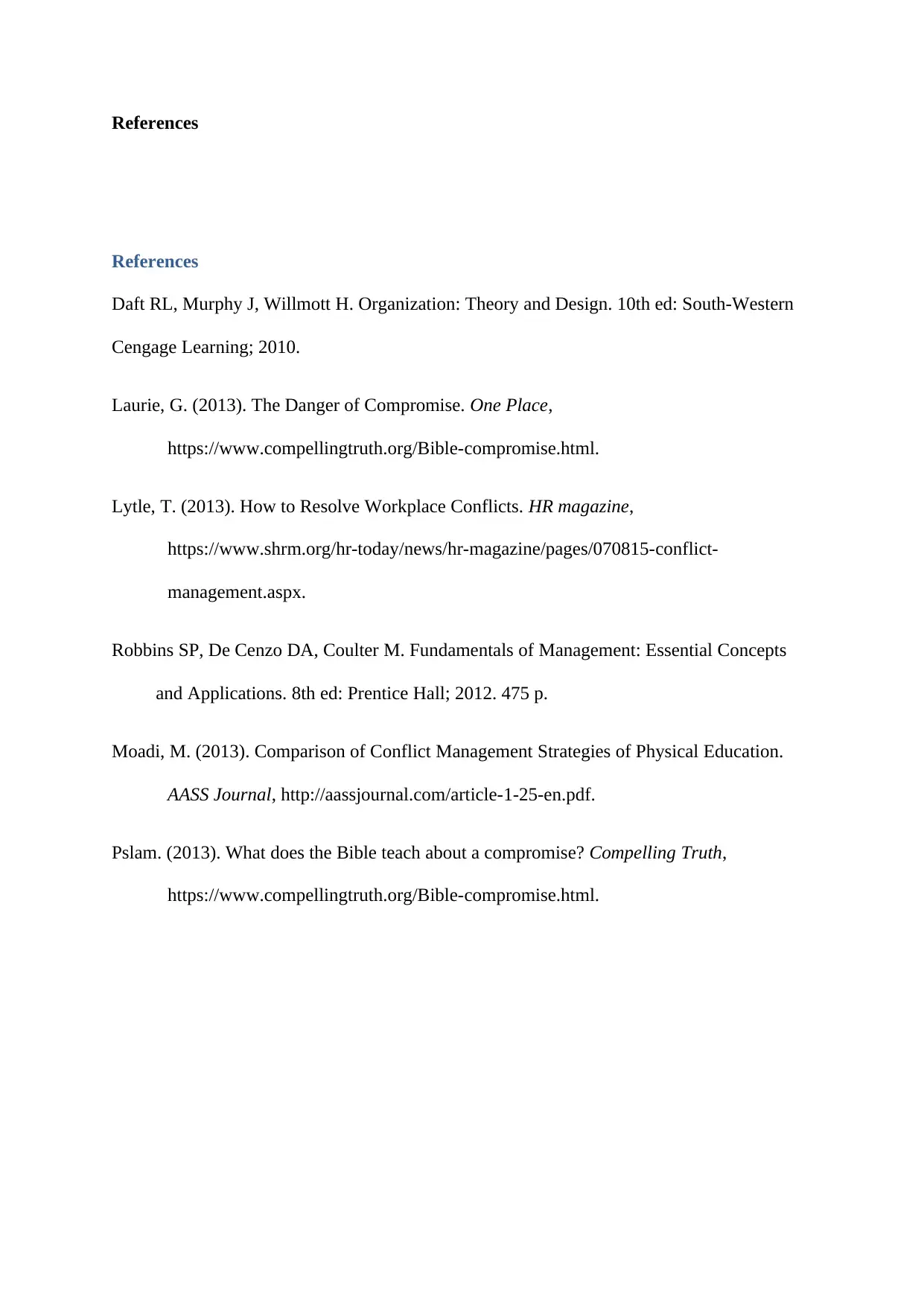
References
References
Daft RL, Murphy J, Willmott H. Organization: Theory and Design. 10th ed: South-Western
Cengage Learning; 2010.
Laurie, G. (2013). The Danger of Compromise. One Place,
https://www.compellingtruth.org/Bible-compromise.html.
Lytle, T. (2013). How to Resolve Workplace Conflicts. HR magazine,
https://www.shrm.org/hr-today/news/hr-magazine/pages/070815-conflict-
management.aspx.
Robbins SP, De Cenzo DA, Coulter M. Fundamentals of Management: Essential Concepts
and Applications. 8th ed: Prentice Hall; 2012. 475 p.
Moadi, M. (2013). Comparison of Conflict Management Strategies of Physical Education.
AASS Journal, http://aassjournal.com/article-1-25-en.pdf.
Pslam. (2013). What does the Bible teach about a compromise? Compelling Truth,
https://www.compellingtruth.org/Bible-compromise.html.
References
Daft RL, Murphy J, Willmott H. Organization: Theory and Design. 10th ed: South-Western
Cengage Learning; 2010.
Laurie, G. (2013). The Danger of Compromise. One Place,
https://www.compellingtruth.org/Bible-compromise.html.
Lytle, T. (2013). How to Resolve Workplace Conflicts. HR magazine,
https://www.shrm.org/hr-today/news/hr-magazine/pages/070815-conflict-
management.aspx.
Robbins SP, De Cenzo DA, Coulter M. Fundamentals of Management: Essential Concepts
and Applications. 8th ed: Prentice Hall; 2012. 475 p.
Moadi, M. (2013). Comparison of Conflict Management Strategies of Physical Education.
AASS Journal, http://aassjournal.com/article-1-25-en.pdf.
Pslam. (2013). What does the Bible teach about a compromise? Compelling Truth,
https://www.compellingtruth.org/Bible-compromise.html.
⊘ This is a preview!⊘
Do you want full access?
Subscribe today to unlock all pages.

Trusted by 1+ million students worldwide
1 out of 6
Your All-in-One AI-Powered Toolkit for Academic Success.
+13062052269
info@desklib.com
Available 24*7 on WhatsApp / Email
![[object Object]](/_next/static/media/star-bottom.7253800d.svg)
Unlock your academic potential
Copyright © 2020–2026 A2Z Services. All Rights Reserved. Developed and managed by ZUCOL.
